After twelve glorious years living in Iowa City, I’m moving. My family and I are moving further north in Iowa’s Creative Corridor, far enough to make my husband’s Cedar Rapids commute shorter but not so far that we still can’t think of ourselves as Iowa City folks. Because we are Iowa City folks, and always will be, but now we’re going to be the kind of Iowa City folks who live in the country with chickens and fruit trees and a huge vegetable garden and a root cellar and some woods and maybe a goat.
Which means we are packing up all of our stuff. ALL of our STUFF. So much stuff. A few months ago when we were first showing our house to potential buyers, we packed up two storage garages full of stuff that we didn’t really need at the moment, but somehow we’re still packing and we really haven’t come to the point where we need something and can’t find it. Why is it that we can pack up two storage garages full of stuff and not ever need it? Why do we have all this stuff?
Kids. Kids is why we have all this stuff. I suspect that any parent who has gone through the moving process post-kids has discovered roughly the same situation. There are seasonal toys, toys for each holiday, toys to go with each favorite movie, hobby, and theme, toys given as gifts, toys bought for a quarter at garage sales because I just wanted them to be quiet and let me browse, and toys that I don’t even know where they came from. Do our kids need all these toys? Do our kids appreciate all these toys? Are these toys even beneficial for our kids?
As I’ve weeded toys from my life recently, I’ve come to some realizations about which ones add value and which ones are more of a time-sucking distraction. I would like to present to you a way to reduce the toys in your life. A way to limit new toys coming into your life. A way to add value and purpose to the way your children play with the toys they have. I call it: The Case for Open-Ended Toys.
An open-ended toy, at its simplest, is just a toy whose form and function doesn’t explicitly prescribe how to play with it. If there’s one way to play with it, it is not an open-ended toy. For example, a horse figurine? Open-ended! The horse Maximus from the movie Tangled with Flynn Ryder riding him? Not open-ended. Using this definition of “open-ended”, here are some huge benefits to choosing these kinds of toys for your kids:
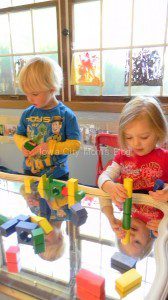
Multi-age
Open-ended toys don’t fall out of vogue as fast, simply because they aren’t tied to moment-in-time pop culture. A horse figurine can be equally enjoyed by a toddler as a pre-teen, though each will discover different uses for it, and it will take on many different roles and purposes as a child grows.
Multi-disciplinary
Open-ended toys lend themselves to the kind of broad, diverse play scenarios that are borne out of a child’s imagination, not by following the script of a well-known movie. A clipboard, a calculator, a table, and some paper and a pencil can instantly become a doctor’s office, a grocery store, a space ship, a school…almost anything. It is in these play scenarios that kids can incorporate writing, imagining, reading, math, negotiating, science, and social skills galore.
Multi-purpose
A good open-ended toy won’t be limited to one use or one type of play. A set of linking chains, for example, could be used in dramatic play as a way to lock up prisoners. They could be used as a leash to walk a stuffed dog. They could be used to solve math problems. They could be used to decorate play dough, or as pretend food, or in a sensory table. Not so for that Little Suzie Hair Salon.
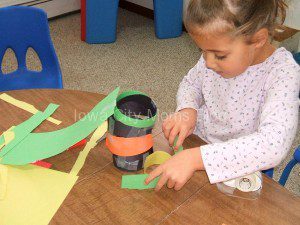
Cognitive flexibility
A child playing with an open-ended toy has the chance to develop their cognitive flexibility, seeing an object for what it could be, imagining new uses, and stretching their brain schema to accommodate new possibilities and ideas.
Gender Neutrality
Open-ended toys are less likely to be easily or solidly placed in either “the pink aisle” or “the blue aisle”. If we can be convinced that there are certain toys that only girls like and certain toys that only boys like, your household toy collection just doubled. Good news for the toy store! Bad news for your house clutter. Moreover, do we want to buy into the notion that girls and boys are so different and polarized as to not be able to play with each other’s toys? Might that limit our kids’ self-image, interests, and future goals?
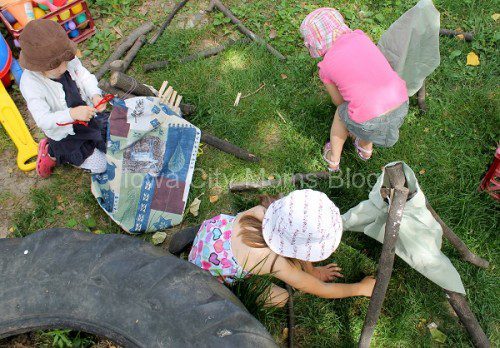
Media freedom
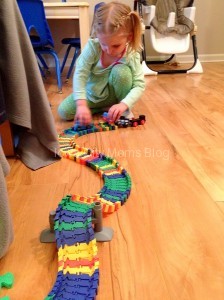
Our kids are going to see an amazing repertoire of media-based consumer products, chosen specifically to catch their eye and make them WANT. Everything from clothing to hygiene products to food will be marketed with their favorite characters, and a whole new slew of products will come out with each new passing fad, movie, and pop culture craze. It may not work for everyone, but in our house we have chosen to only buy products that are not tied to movies or TV shows. That is a choice we get to make as parents for now, as we are the ones paying for things.
Imagination
The beauty of not having a house full of gender- or movie-specific character toys, is that we can see our kids use their own imaginations to create scenarios and play scripts that are important to them, instead of relying on ready-made objects and prepackaged activities. Do they love the movie Frozen? Watch them use that long strip of cloth to wrap around themselves to make an ice dress like Elsa. Watch them use those blocks to design and build their very own ice castle, carefully searching the room for extra props that might suit their needs. See them negotiate with their siblings and friends to choose what to play, who does what, which props they need, and how to play. If the toy provides all the details, what is left for the kids to imagine, beyond simply acting out a script?
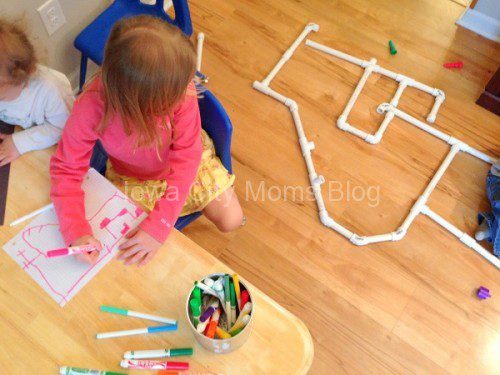
While we don’t harbor any delusions that we are keeping our kids from ever participating in the media culture or enjoying those types of toys while at friends’ houses, and we certainly don’t demonize those things, the truth is we are in charge of buying practices for now. Choosing open-ended toys can be a powerful way to give your child freedom in their play, as well as cut down on the character detritus in your home. An all-out overhaul of the toy room may not work for you or your family, but a thoughtful approach to our buying practices can make a difference in both how our homes feel and how our kids play.
Do you have a favorite open-ended toy that your children have enjoyed?






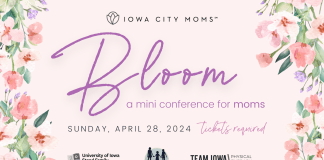




YES! No detritus!
Yes! In a world dominated passive entertainment I fear children’s creativity is too often boxed in with “not open-ended” toys. My boy is only one, so he still finds wooden spoons and measuring cups exciting.
My son really likes these kinds of pots and pans and has got a great time playing with them.
There are several nicks within the paint but that is because
of way of hurt in two years. It has been a fantastic addition for her imaginary perform too.